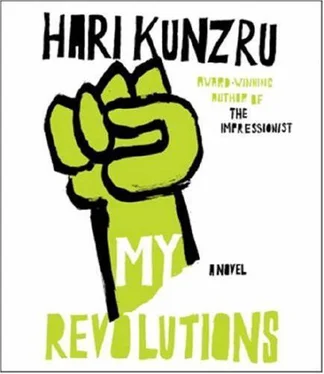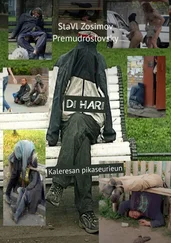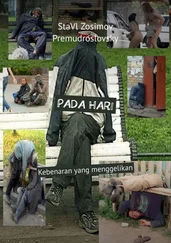I take a swig of bottled water, start the engine, and swing back out on to the road. Round and round.
As that first afternoon at Free Pictures turned into evening, people started to drift off to their next destinations and the usher was kept busy climbing up and down the ladder to let them out. The girl who threw the stone left with a black man in a leather jacket. I would have followed her, but I was reluctant to leave the roof, knowing that as soon as I stepped on to the street I’d be back on my own, in depressive limbo. The pirate who’d argued with the other speakers also seemed annoyed to see her go. Sprawled next to me, apparently exhausted, he swore under his breath, then propped himself up on his elbows and announced that he was hungry. I said I was too. “So,” he suggested, “let’s go get something to eat.”
Even now it’s hard to talk about Sean Ward without romanticizing him. He was a handsome bastard, with a fine, rather delicate jawline he hid with a full beard, a crooked nose, wavy dark hair, and heavy-lidded brown eyes. His looks were the first thing everyone noticed about him and he knew what to do with them. Red Sean, fucker of the unfuckable, charmer of the barmaid and the arresting officer. To those who just remember him in the early
days, or who take their history from some of the frothier journalism about Anna, the romance is all that survives. I’m almost invisible in those books, a bearded oval in a couple of fuzzy group photos. Sean is omnipresent — but somehow simplified, bleached out into some kind of revolutionary rock star. The pictures (of which there are surprisingly few) tend to show him with rock-star accoutrements, dark glasses, his battered biker jacket. There he is, smoking a cigarette, throwing an arm casually over Anna’s shoulders. There he is, standing on a hillside in Wales, waving a huge flag. As far as the world’s concerned (if it’s concerned at all anymore), he’s just a footnote to Anna’s story, and since she’s been so distorted, it’s as if the real Sean, the Sean who was paranoid and generous and self-denying and confrontational and just vain enough to have liked those rock-star photos, has almost vanished behind a haze of Byronic bullshit.
The other cardboard cut-out of Sean is, of course, the social deviant, a member of the criminal classes led astray by a superficial engagement with politics. The stories about his hard-knock upbringing aren’t exaggerated. He was from a sprawling London-Irish clan that had disintegrated when he was a kid, spitting him into a series of foster homes from which he ran away, then reformatory, from which he couldn’t. He’d stolen a car, or rather many cars, but the one they got him for was a Jag he drove into a lamppost during some kind of police chase, aged fifteen. Even when I knew him, he had a thing about fast cars, the more expensive the better. I think there was an element of revenge, of abusing rich men’s toys. Yes, he had no education in the traditional sense, except what he’d given himself. Yes, he was impatient with theorizing, but it was an earned impatience, one I came to share. When I first met him at Free Pictures, all he wanted to talk about was books. It still makes me angry to see him painted as some kind of noble savage, a thug who didn’t know what he was doing.
Sean had drifted around. He’d done part of a plumbing apprenticeship, which he gave up, he told me, when he realized he wasn’t prepared to spend his life sticking his hand into other people’s
toilets. At one point he’d thought of joining the army. By the time I met him, he’d been in Notting Hill for a couple of years, making a living in a variety of ways — a little carpentry, a little hash dealing, delivering furniture in Rosa, a ten-year-old combi-van he’d painted a sickly shade of flesh-pink. In search of food, he led me through the frosted-glass door of a café on All Saints Road. “Hello, Gloria,” he said cheerfully, striding up to the counter and grinning at the stout black woman behind it. I followed him gingerly, feeling as if I’d stepped into the saloon bar scene in a Western. Men in work clothes or suits and skinny brim hats were hunched over the Formica tables, narrowing their eyes and kissing their teeth at us. The hostility was almost palpable.
“You have to go eat it at home,” Gloria told us. “We very busy tonight.”
“It’s all right, Gloria darling,” wheedled Sean. “We can just take it upstairs.”
She shook her head. “It’s Saturday night. You go upstairs it always upsets some people. I won’t have it, not on a Saturday.”
“But—”
“Not on a Saturday. Anyway, how I know your friend been brought up to mind his business? You tell me that.”
Sean put on a particularly winning smile. “It’s all right. He’s not about to cause any aggravation.” Gloria shook her head definitively. We ordered and hung around, waiting for her to finish shouting at whoever was doing the cooking. Her customers went back to their suppers. At the time I was confused by their resentment. I was, as I thought of it, “on their side.” Having said that, I still remember my shamefully instinctive recoil, my little moment of panic at the sight of all those black faces staring at me.
Gloria started wrapping up our food, but Sean kept hassling her to let us join in with whatever was happening upstairs. It looked as if she was about to relent until she noticed my bare and by now rather dirty feet. After that it was definitely no dice. Sean was told never to bring such a filthy good-for-nothing (her word) into her establishment (also her word) again. We took our supper and left
in a hurry, me rattled, Sean laughing. A month or so later we were finally allowed upstairs, though not on a Saturday night, and I caught a glimpse of another of London’s many undergrounds, Gloria’s miniature shebeen, where in her packed living room grizzled old men bet on cards and young ones smoked reefer out of the window, a scene of minor debauchery acted out to the terrible Jim Reeves records she played on her old Dansette.
We took our goat curry back to Vicky’s flat. On the way, Sean stopped off at a house under the shadow of the half-built flyover, rang the bell and in a brief transaction conducted through a barely cracked front door took possession of a bottle of Wray & Nephew’s rum and a quarter of powerful-smelling weed. After we’d eaten I lounged around on the rug as Sean unsuccessfully mined Vicky’s record collection for rock music. Within an hour or so we were back on the road, several shots into our game and walking with a swagger that, while not yet a stagger, was already showing transitional signs. Just after eleven Sean handed me a tiny barrel-shaped tablet and some time around midnight I came up on my first ever acid trip.
We were back in the flat and I was telling Sean how pathetic it was to be grateful for gammon and boiled potatoes, when I noticed the paint was starting to peel off the wall behind his head. Gammon and potatoes was what Vicky could cook — and had — three times in the previous week. It was better than the food in prison, though that wasn’t saying much. At that point in my life it wouldn’t have occurred to me to make a meal for myself when there was a woman around to do it, and I was presenting myself to Sean as a sailor on the culinary seas of fate, doomed to wander oceans of blandness until I came upon the “islands of curried goat,” a phrase I found unaccountably entertaining — and odd, if I was honest, part of a general sharpening of words and things that I’d just begun to notice. Sean grinned, looking at me with an inscrutable glint in his eye. The paint really was coming off, whole patches of it cracking and bubbling, giving the wall a scaly appearance disturbingly suggestive of giant reptilian life. The light in the room,
Читать дальше












